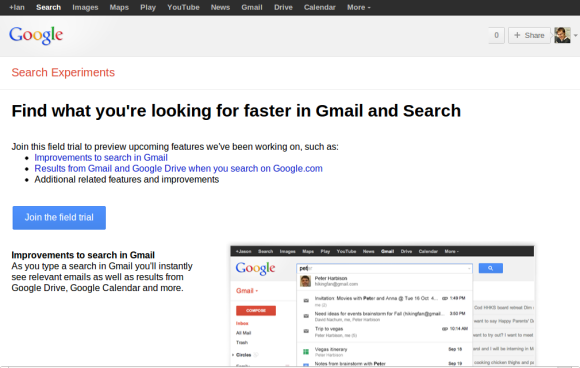Google recently announced an updated search experiment that lets you integrate documents from Google Drive and Calendar appointments into your searches on Google.com and Gmail. Integrated search will also include improvements to Gmail’s new autocomplete feature including results from Drive, Calendar, as well as e-mail. Frequent fliers will also see an improved flight tracking feature that includes current flight information on Google.com for any upcoming flights with itineraries saved in Gmail.

Google’s new integrated search experiment expands the company’s field trial launched in August that brings together results from your Gmail account into your own searches on Google.com. In October, Google also added the ability for Gmail users to search text and data inside attachmentsthat use common file formats such as PDF, DOC (Microsoft Word), and PPT (PowerPoint).

Google’s new beta test requires you to sign up at the integrated search field trial page, even if you’re already participating in the current Gmail-search mashup. The new feature is only available in English and only for @gmail.com addresses. Google says the field trial has limited space and the company may not be able to accommodate every person interested in the experiment. Once you’ve signed up, Google will send you an e-mail when your account is activated for the new trial. You have to be signed in to your Google account to use the new feature, and your personal data will only appear in your search results, not someone else’s.
Google’s new field trial is an example of the integrated services the company is hoping to roll out after the company unified most of its user privacy policies in March. But Google’s changes are starting to face challenges from European consumer protection authorities. On Tuesday, France’s National Commission on Information Technology and Civil Liberties, on behalf of European data protection authorities, asked Google to “ modify its practices when combining [user] data across services.” The commission issued three main recommendations for Google:
“reinforce users’ consent” to the combination of data for new and improved services, advertising and analytics.
provide an opt-out mechanism for users that don’t want to combine data across services; and allow more user control over which services can combine data.
“adapt the tools used by Google for the combination of data so that it remains limited to the authorized purposes.”